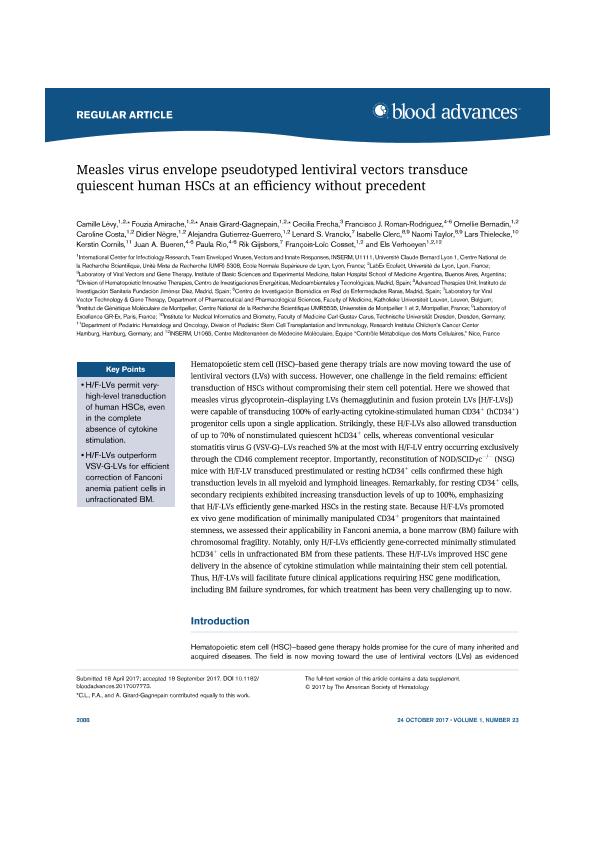Mostrar el registro sencillo del ítem
dc.contributor.author
Lévy, Camille

dc.contributor.author
Amirache, Fouzia

dc.contributor.author
Girard Gagnepain, Anais

dc.contributor.author
Frecha, Cecilia Ariana

dc.contributor.author
Roman Rodríguez, Francisco J.
dc.contributor.author
Bernadin, Ornellie
dc.contributor.author
Costa, Caroline

dc.contributor.author
Nègre, Didier

dc.contributor.author
Gutierrez Guerrero, Alejandra
dc.contributor.author
Vranckx, Lenard S.
dc.contributor.author
Clerc, Isabelle
dc.contributor.author
Taylor, Naomi
dc.contributor.author
Thielecke, Lars
dc.contributor.author
Cornils, Kerstin
dc.contributor.author
Bueren, Juan A.
dc.contributor.author
Rio, Paula
dc.contributor.author
Gijsbers, Rik
dc.contributor.author
Cosset, François Loïc
dc.contributor.author
Verhoeyen, Els

dc.date.available
2019-05-10T18:14:37Z
dc.date.issued
2017-10
dc.identifier.citation
Lévy, Camille; Amirache, Fouzia; Girard Gagnepain, Anais; Frecha, Cecilia Ariana; Roman Rodríguez, Francisco J.; et al.; Measles virus envelope pseudotyped lentiviral vectors transduce quiescent human HSCs at an efficiency without precedent; American Society of Hematology; Blood Advances; 1; 23; 10-2017; 2088-2104
dc.identifier.issn
2473-9537
dc.identifier.uri
http://hdl.handle.net/11336/76063
dc.description.abstract
Hematopoietic stem cell (HSC)–based gene therapy trials are now moving toward the use of lentiviral vectors (LVs) with success. However, one challenge in the field remains: efficient transduction of HSCs without compromising their stem cell potential. Here we showed that measles virus glycoprotein–displaying LVs (hemagglutinin and fusion protein LVs [H/F-LVs]) were capable of transducing 100% of early-acting cytokine-stimulated human CD34+ (hCD34+) progenitor cells upon a single application. Strikingly, these H/F-LVs also allowed transduction of up to 70% of nonstimulated quiescent hCD34+ cells, whereas conventional vesicular stomatitis virus G (VSV-G)–LVs reached 5% at the most with H/F-LV entry occurring exclusively through the CD46 complement receptor. Importantly, reconstitution of NOD/SCIDγc−/− (NSG) mice with H/F-LV transduced prestimulated or resting hCD34+ cells confirmed these high transduction levels in all myeloid and lymphoid lineages. Remarkably, for resting CD34+ cells, secondary recipients exhibited increasing transduction levels of up to 100%, emphasizing that H/F-LVs efficiently gene-marked HSCs in the resting state. Because H/F-LVs promoted ex vivo gene modification of minimally manipulated CD34+ progenitors that maintained stemness, we assessed their applicability in Fanconi anemia, a bone marrow (BM) failure with chromosomal fragility. Notably, only H/F-LVs efficiently gene-corrected minimally stimulated hCD34+ cells in unfractionated BM from these patients. These H/F-LVs improved HSC gene delivery in the absence of cytokine stimulation while maintaining their stem cell potential. Thus, H/F-LVs will facilitate future clinical applications requiring HSC gene modification, including BM failure syndromes, for which treatment has been very challenging up to now.
dc.format
application/pdf
dc.language.iso
eng
dc.publisher
American Society of Hematology

dc.rights
info:eu-repo/semantics/openAccess
dc.rights.uri
https://creativecommons.org/licenses/by-nc-sa/2.5/ar/
dc.subject
Genetherapy
dc.subject
Lentiviral Vectors
dc.subject
Pseudotype
dc.subject
Raga Mice
dc.subject.classification
Otras Biotecnologías de la Salud

dc.subject.classification
Biotecnología de la Salud

dc.subject.classification
CIENCIAS MÉDICAS Y DE LA SALUD

dc.title
Measles virus envelope pseudotyped lentiviral vectors transduce quiescent human HSCs at an efficiency without precedent
dc.type
info:eu-repo/semantics/article
dc.type
info:ar-repo/semantics/artículo
dc.type
info:eu-repo/semantics/publishedVersion
dc.date.updated
2019-04-25T14:08:44Z
dc.journal.volume
1
dc.journal.number
23
dc.journal.pagination
2088-2104
dc.journal.pais
Estados Unidos

dc.journal.ciudad
Washington DC
dc.description.fil
Fil: Lévy, Camille. Université Claude Bernard Lyon 1; Francia. Centre National de la Recherche Scientifique; Francia. Inserm; Francia
dc.description.fil
Fil: Amirache, Fouzia. Université Claude Bernard Lyon 1; Francia. Centre National de la Recherche Scientifique; Francia. Inserm; Francia
dc.description.fil
Fil: Girard Gagnepain, Anais. Université Claude Bernard Lyon 1; Francia. Centre National de la Recherche Scientifique; Francia. Inserm; Francia
dc.description.fil
Fil: Frecha, Cecilia Ariana. Consejo Nacional de Investigaciones Científicas y Técnicas; Argentina. Instituto Universidad Escuela de Medicina del Hospital Italiano; Argentina
dc.description.fil
Fil: Roman Rodríguez, Francisco J.. Consejo Superior de Investigaciones Científicas; España. Centro de Investigaciones Energéticas, Medioambientales y Tecnológicas; España. Instituto de Investigación Sanitaria Fundación Jiménez Díaz; España
dc.description.fil
Fil: Bernadin, Ornellie. Université Claude Bernard Lyon 1; Francia. Centre National de la Recherche Scientifique; Francia. Inserm; Francia
dc.description.fil
Fil: Costa, Caroline. Université Claude Bernard Lyon 1; Francia. Centre National de la Recherche Scientifique; Francia. Inserm; Francia
dc.description.fil
Fil: Nègre, Didier. Université Claude Bernard Lyon 1; Francia. Centre National de la Recherche Scientifique; Francia. Inserm; Francia
dc.description.fil
Fil: Gutierrez Guerrero, Alejandra. Université Claude Bernard Lyon 1; Francia. Centre National de la Recherche Scientifique; Francia. Inserm; Francia
dc.description.fil
Fil: Vranckx, Lenard S.. Katholikie Universiteit Leuven; Bélgica
dc.description.fil
Fil: Clerc, Isabelle. Université Montpellier II; Francia. Centre National de la Recherche Scientifique; Francia
dc.description.fil
Fil: Taylor, Naomi. Université Montpellier II; Francia. Centre National de la Recherche Scientifique; Francia
dc.description.fil
Fil: Thielecke, Lars. Technische Universität Dresden; Alemania
dc.description.fil
Fil: Cornils, Kerstin. Research Institute Children’s Cancer Center Hamburg; Alemania
dc.description.fil
Fil: Bueren, Juan A.. Centro de Investigaciones Energéticas, Medioambientales y Tecnológicas; España. Instituto de Investigación Sanitaria Fundación Jiménez Díaz; España. Consejo Superior de Investigaciones Científicas; España
dc.description.fil
Fil: Rio, Paula. Centro de Investigaciones Energéticas, Medioambientales y Tecnológicas; España. Instituto de Investigación Sanitaria Fundación Jiménez Díaz; España. Consejo Superior de Investigaciones Científicas; España
dc.description.fil
Fil: Gijsbers, Rik. Katholikie Universiteit Leuven; Bélgica
dc.description.fil
Fil: Cosset, François Loïc. Centre National de la Recherche Scientifique; Francia. Université Claude Bernard Lyon 1; Francia. Inserm; Francia
dc.description.fil
Fil: Verhoeyen, Els. Université Claude Bernard Lyon 1; Francia. Centre National de la Recherche Scientifique; Francia. Inserm; Francia
dc.journal.title
Blood Advances
dc.relation.alternativeid
info:eu-repo/semantics/altIdentifier/url/https://www.ncbi.nlm.nih.gov/pmc/articles/PMC5728281/
dc.relation.alternativeid
info:eu-repo/semantics/altIdentifier/url/http://www.bloodadvances.org/content/1/23/2088.long?sso-checked=true
dc.relation.alternativeid
info:eu-repo/semantics/altIdentifier/doi/https://doi.org/10.1182/bloodadvances.2017007773
Archivos asociados
